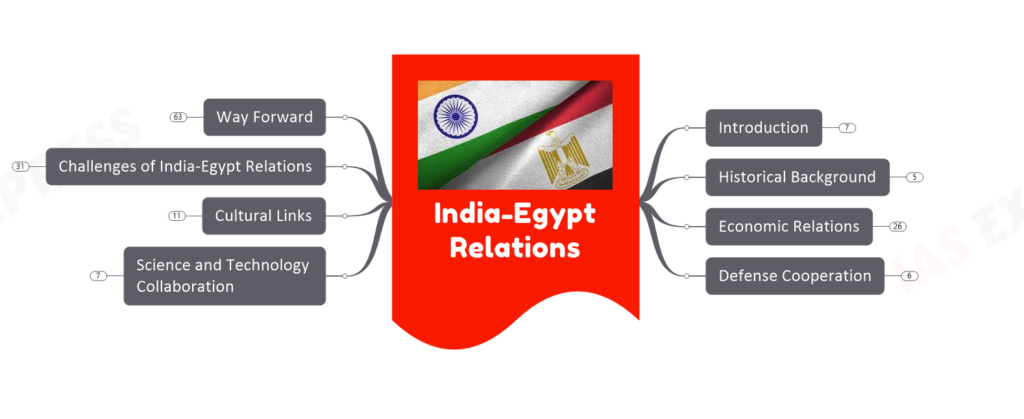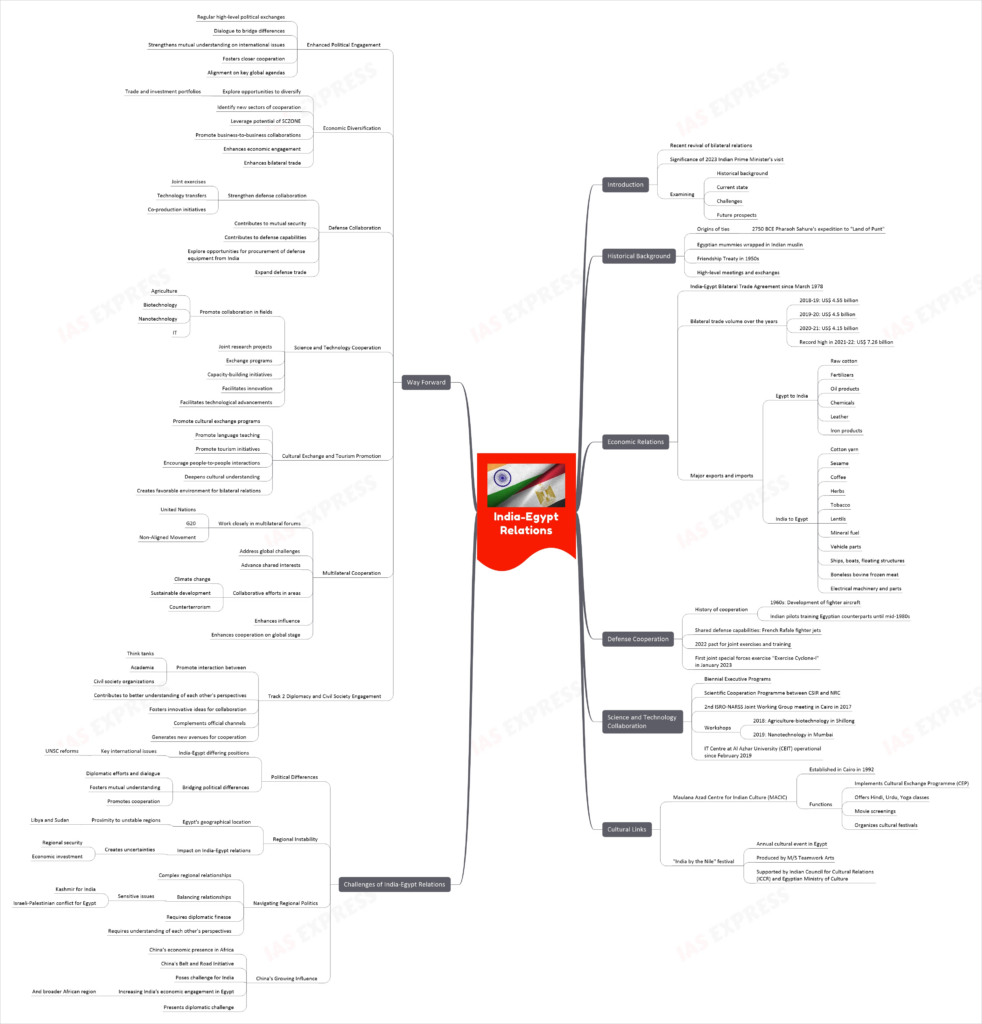India-Egypt Relations: History, Challenges, Recent Developments

From Current Affairs Notes for UPSC » Editorials & In-depths » This topic
IAS EXPRESS Vs UPSC Prelims 2024: 85+ questions reflected
I. Introduction
India and Egypt have recently experienced a significant revival in their bilateral relations. The Indian Prime Minister’s visit to Egypt in 2023 marked a crucial moment in strengthening the ties between the two nations. This article examines the historical background, current state, challenges, and future prospects of India-Egypt relations. The focus is on the grand revival of this important partnership, driven by historical connections and the changing geopolitical landscape.

II. Historical Background
India-Egypt relations have a deep historical foundation. The origins of these ties can be traced back to 2750 BCE when the Pharaoh Sahure sent ships to the “Land of Punt,” believed to be peninsular India. The exchange between the two civilizations continued over the centuries, with Egyptian mummies being wrapped in Indian indigo-dyed muslin in the second millennium BCE. This early interaction laid the groundwork for future cultural and economic exchanges.
The bond between India and Egypt grew stronger in the 1950s when they signed a historic Friendship Treaty in 1955. Since then, the two countries have enjoyed traditionally robust bilateral relations, characterized by regular high-level meetings and exchanges. These interactions have played a crucial role in fostering mutual understanding and cooperation.
III. Economic Relations
Economic ties between India and Egypt have seen significant growth over the years. The India-Egypt Bilateral Trade Agreement, in effect since March 1978, operates under the Most Favoured Nation clause. In the fiscal year 2018-19, bilateral trade reached a value of US$ 4.55 billion. Despite the challenges posed by the pandemic, trade volume only experienced a slight decline to US$ 4.5 billion in 2019-20 and further decreased to US$ 4.15 billion in 2020-21. However, it is worth noting that bilateral trade between India and Egypt reached a record high of US$ 7.26 billion in the fiscal year 2021-22.
The trade between the two countries is diverse, with major Egyptian exports to India including raw cotton, raw and manufactured fertilizers, oil and oil products, organic and non-organic chemicals, leather, and iron products. On the other hand, major imports into Egypt from India include cotton yarn, sesame, coffee, herbs, tobacco, and lentils. Additionally, India exports mineral fuel, vehicle parts, ships, boats, floating structures, cuts of boneless bovine frozen meat, and electrical machinery and parts to Egypt.
IV. Defense Cooperation
India and Egypt have a strong history of defense cooperation. In the 1960s, the two countries collaborated on the development of fighter aircraft, and Indian pilots trained their Egyptian counterparts until the mid-1980s. Presently, both the Indian Air Force (IAF) and the Egyptian air force fly the French Rafale fighter jets, showcasing their shared defense capabilities.
In 2022, a pact was signed between India and Egypt, paving the way for joint exercises and cooperation in training. The first joint special forces exercise, named “Exercise Cyclone-I,” was completed in January 2023 in Jaisalmer, Rajasthan. These joint military endeavors contribute to strengthening the defense capabilities of both nations and foster closer defense ties.
V. Science and Technology Collaboration
India and Egypt have actively pursued cooperation in the field of science and technology. This collaboration is facilitated through biennial Executive Programs and the Scientific Cooperation Programme between India’s Council of Scientific and Industrial Research (CSIR) and Egypt’s National Research Center (NRC). The two countries have also held the 2nd ISRO-NARSS Joint Working Group meeting in Cairo in 2017.
Furthermore, India and Egypt have organized workshops on agriculture-biotechnology and nanotechnology in Shillong in 2018and Mumbai in 2019, respectively. These workshops serve as platforms for knowledge exchange and collaboration in cutting-edge scientific fields. Additionally, an IT Centre at Al Azhar University, known as CEIT, has been operational since February 2019, further promoting technological cooperation between the two nations.
VI. Cultural Links
Cultural cooperation plays a significant role in India-Egypt relations. The Maulana Azad Centre for Indian Culture (MACIC), established in Cairo in 1992, serves as a platform to promote cultural exchange between the two countries. MACIC implements the Cultural Exchange Programme (CEP) and offers Hindi, Urdu, and Yoga classes, as well as movie screenings, to popularize Indian culture in Egypt. The center also organizes cultural festivals that showcase the diversity of Indian arts, traditions, and customs.
One of the notable cultural events is the annual “India by the Nile” festival celebrated in Egypt. This festival brings the essence of India through classical, contemporary, performing and visual arts, food, and popular culture. It acts as a vibrant platform that amalgamates diverse cultural and artistic strands, fostering a deeper understanding and appreciation of Indian culture in Egypt. The festival is produced by M/S Teamwork Arts based in Delhi and receives support from the Indian Council for Cultural Relations (ICCR) and the Egyptian Ministry of Culture.
VII. Challenges of India-Egypt Relations
While India-Egypt relations have experienced significant progress, there are several challenges that both countries need to navigate:
- Political Differences: India and Egypt have occasionally held differing positions on key international issues, including the United Nations Security Council (UNSC) reforms. Bridging these political differences requires diplomatic efforts and dialogue to foster mutual understanding and cooperation.
- Regional Instability: Egypt’s geographical location in North Africa places it in proximity to several unstable regions and conflict zones, such as Libya and Sudan. The regional instability indirectly impacts India-Egypt relations by creating uncertainties in areas of mutual interest, including regional security and economic investment.
- Navigating Regional Politics: Both India and Egypt face the challenge of navigating complex regional relationships. Balancing these relationships, particularly concerning sensitive issues like Kashmir for India or the Israeli-Palestinian conflict for Egypt, requires diplomatic finesse and an understanding of each other’s perspectives.
- China’s Growing Influence: China’s increasing economic presence in Africa, including Egypt, poses a significant challenge for India. China’s Belt and Road Initiative has gained traction in the region, elevating its influence. Balancing relations with China while increasing India’s economic engagement in Egypt and the broader African region presents a diplomatic challenge.
VIII. Way Forward
To overcome the challenges and further strengthen India-Egypt relations, the following steps can be taken:
- Enhanced Political Engagement: Regular high-level political exchanges and dialogue should be prioritized to bridge differences and strengthen mutual understanding on international issues. This will foster closer cooperation and alignment on key global agendas.
- Economic Diversification: Both countries should explore opportunities to diversify their trade and investment portfolios. Identifying new sectors of cooperation, leveraging the potential of the Suez Canal Economic Zone (SCZONE), and promoting business-to-business collaborations will enhance economic engagement and bilateral trade.
- Defense Collaboration: Strengthening defense collaboration through joint exercises, technology transfers, and co-production initiatives will contribute to mutual security and defense capabilities. Exploring opportunities for the procurement of defense equipment from India and expanding defense trade should be pursued.
- Science and Technology Cooperation: India and Egypt should continue to promote collaboration in the fields of agriculture, biotechnology, nanotechnology, and IT. Joint research projects, exchange programs, and capacity-building initiatives will facilitate innovation and technological advancements in both countries.
- Cultural Exchange and Tourism Promotion: Efforts should be made to further promotecultural exchange programs, language teaching, and tourism initiatives. Encouraging more people-to-people interactions will deepen cultural understanding and create a favorable environment for bilateral relations.
- Multilateral Cooperation: India and Egypt can work closely in multilateral forums such as the United Nations, G20, and Non-Aligned Movement to address global challenges and advance shared interests. Collaborative efforts in areas such as climate change, sustainable development, and counterterrorism will enhance their influence and cooperation on the global stage.
- Track 2 Diplomacy and Civil Society Engagement: Promoting greater interaction between think tanks, academia, and civil society organizations can contribute to a better understanding of each other’s perspectives and foster innovative ideas for collaboration. Track 2 diplomacy can complement official channels and generate new avenues for cooperation.
In conclusion, the grand revival of India-Egypt ties is fueled by their historical connections and the current geopolitical landscape. Strengthening economic engagement, defense collaboration, science and technology cooperation, and cultural exchange will pave the way for a fruitful and comprehensive relationship between the two nations. By addressing the challenges and seizing the opportunities, India and Egypt can forge a closer partnership that embraces future economies and autonomous foreign policies.
If you like this post, please share your feedback in the comments section below so that we will upload more posts like this.

